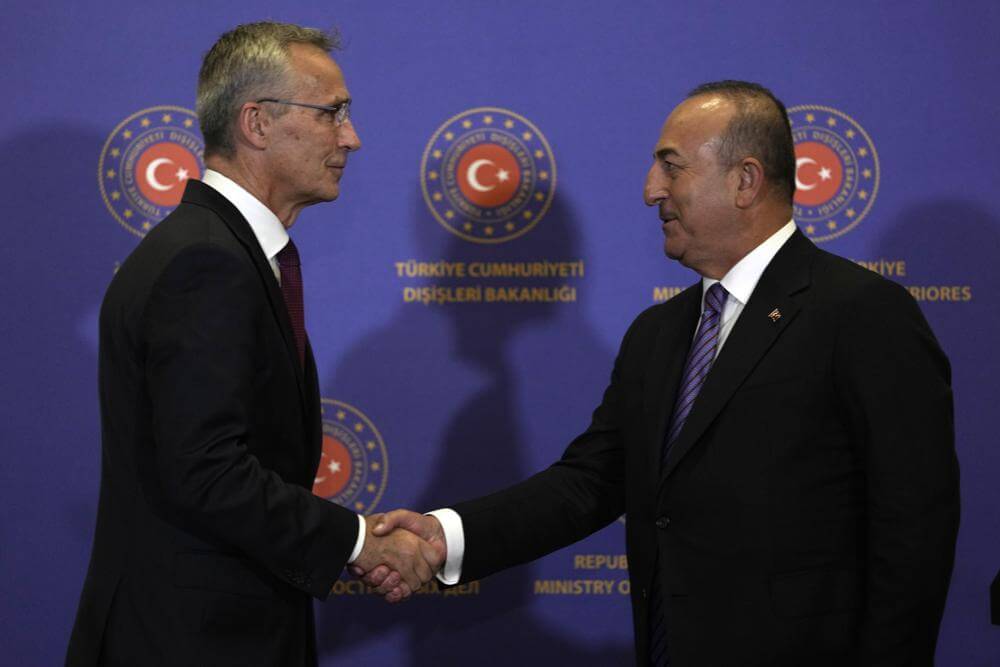Turkish Foreign Minister Mevlüt Çavuşoğlu said on Thursday that Finland and Sweden have not fulfilled their obligations as part of a deal permitting them to enter the North Atlantic Treaty Organization (NATO). Speaking at a joint press conference with NATO Secretary-General Jens Stoltenberg in Istanbul, Çavuşoğlu demanded that the two countries take concrete measures before Turkey gives the green light for their full membership.
“Both countries are expressing that they are committed to the memorandum, but what matters is the execution,” Çavuşoğlu said. He noted that Turkey remains unconvinced that Finland and Sweden have lived up to their commitments under a trilateral deal signed in June in Madrid.
Met w/@JensStoltenberg of @NATO in Istanbul & discussed:
— Mevlüt Çavuşoğlu (@MevlutCavusoglu) November 3, 2022
- latest developments in Ukraine & the continuation of grain deal,
- our common fight against terrorism,
- membership of Sweden and Finland to NATO. pic.twitter.com/sSgaTMw64z
In May, Ankara blocked Helsinki and Stockholm’s bids to join NATO, saying they supported terrorists by harbouring Kurdish militants belonging to the Kurdistan Worker’s Party (PKK) and the People’s Protection Units (YPG). Furthermore, Turkey said it would not approve their bids unless both countries lifted an arms embargo on the Turkish military over their invasion of Syria.
Turkish President Recep Tayyip Erdoğan warned the two Nordic countries that they could not expect concessions from Turkey unless they took “concrete steps” to address Ankara’s concerns.
Also Read: What’s Really Behind Turkey’s Opposition to Finland and Sweden’s NATO Applications?
A month later, Finland and Sweden signed an agreement with Turkey vowing to address Turkish concerns. Helsinki and Stockholm agreed to stop supporting the PKK and the YPG and agreed to extradite Kurdish militants to Turkey. Furthermore, the two countries agreed to remove all arms embargoes imposed on Turkey. In turn, Turkey had agreed to approve Finland and Sweden’s applications on further review of their actions.
In this respect, Çavuşoğlu said that while the two countries had taken positive steps to remove the arms embargoes, they have not fulfilled their promises of extraditing “terrorists.” He thus made no mention of whether or not Turkey would approve of expanding NATO any time soon. So far, all NATO members except Turkey and Hungary have approved Finland and Sweden’s bids.
Great to be back in Istanbul & meet Foreign Minister @MevlutCavusoglu. I commend #Türkiye for its efforts to maintain the vital #Ukraine grain deal. We also addressed the accession of #Finland & #Sweden to #NATO. It is time to welcome them as full members of our Alliance. pic.twitter.com/obyNQnozfB
— Jens Stoltenberg (@jensstoltenberg) November 3, 2022
Against this backdrop, Stoltenberg said “it is time to welcome Finland and Sweden as full members of NATO.” He said their accession would strengthen NATO, especially given Russia’s threat. “In these dangerous times, it is even more important to finalise their accession. To prevent any misunderstanding or miscalculation in Moscow,” he asserted.
Stoltenberg noted that their entry into the Alliance would “send a clear message to Russia that NATO’s door remains open.”
Saying that “Finland and Sweden have delivered on their agreement with Turkey,” Stoltenberg told Çavuşoğlu that “they have become strong partners in our joint fight against terrorism, in all its forms and manifestations.”
After meeting with NATO chief Jens Stoltenberg, Turkish FM Mevlut Cavusoglu says Sweden and Finland are yet to fully meet conditions of agreement concerning their applications for NATO membership pic.twitter.com/TVY1meFT0Z
— TRT World Now (@TRTWorldNow) November 4, 2022
Earlier this week, Finnish Prime Minister Sanna Marin called on Hungary and Turkey to approve Finland and Sweden’s bids. “I think it would be important that this would happen preferably sooner than later,” she mentioned, saying strengthening NATO would present a stronger front against Russia’s actions. Sweden has also urged Turkey to approve their bids.
Following Russia’s invasion of Ukraine in February, Finland and Sweden applied to join NATO, fearing a potential Russian offensive against them. The accession of Finland and Sweden to NATO would double the Alliance’s land border with Russia and expand NATO’s presence eastward, something Russia has repeatedly objected to.
Russia has threatened Finland and Sweden with severe “political and military consequences” if they join the alliance. In fact, it has warned of deploying nuclear weapons to the Baltics. It has also moved its military equipment, including coastal defence systems, to its border with Finland.

